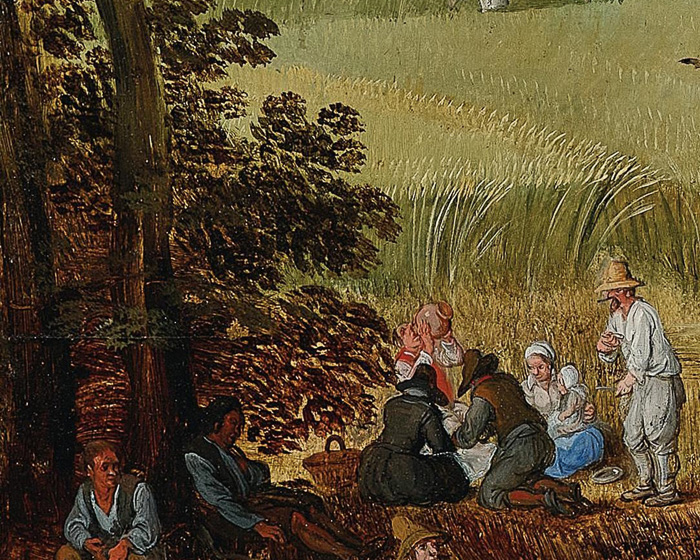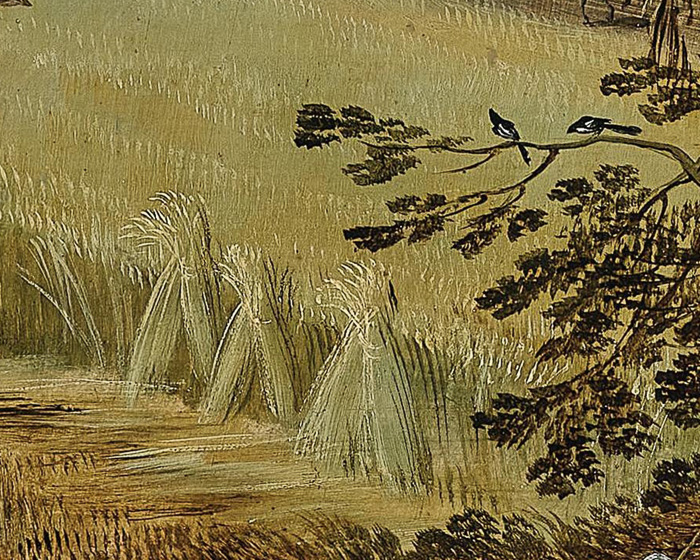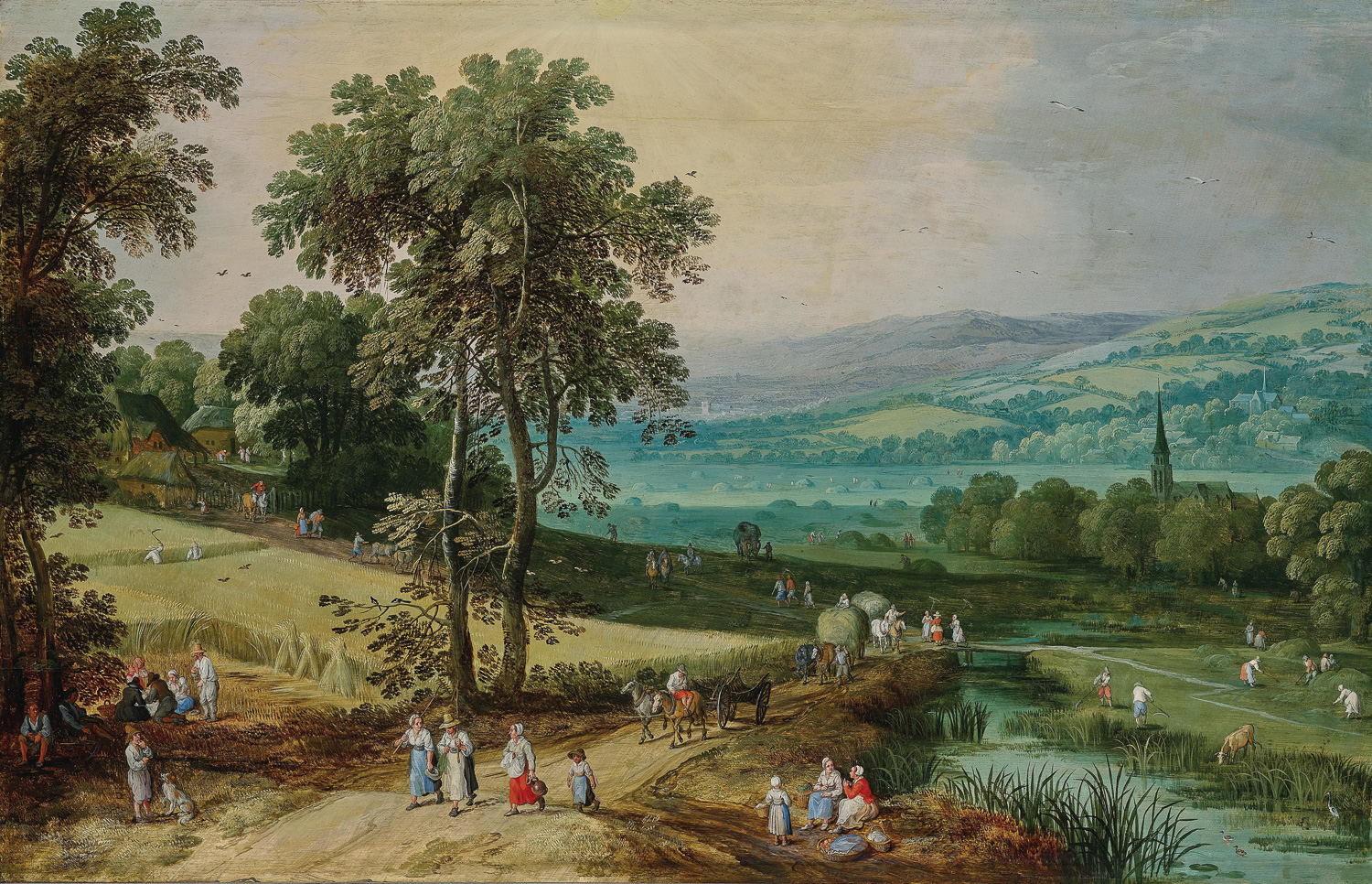
The Pleasures of
Working
Together

Mrs. Tessa Carman
When I was a little girl, going to Grandma’s house meant cookies from blue-and-white porcelain jars, fresh tomato sandwiches on local bakery bread, watching The Sound of Music on VHS (again and again) in the television room, eating sweet corn at suppertime, plunking on the baby-grand piano in the living room, coloring on construction paper at the dining table, rereading storybook fables from my aunt’s bookshelf, and examining the homemade coonskin caps and banjo in my uncles’ old room. Going to Grandma’s house also meant exploring the farm, the four hundred acres of field, forest, and pasture where my dad and his six siblings grew up. There we could traipse through the woodland trails to the river or to the pond, scoot around the farm paths to see what the workers were up to, and sneak into the haymow to find new kittens. Maybe we’d ride with Grandpa on the plow tractor, follow an uncle into the shop to see him repair some machinery, or watch the farm cats dash to the dairy barn to lap from a fresh dish of milk whenever my grandpa called, “Poooor little scrawwwnnny cats!” And if we were there for a holiday, carloads of cousins would be around and we would most likely be getting out costumes for a nativity play, or playing cops and robbers, or whatever else we might dream up.
It was all grand fun. But it was not all fun and games.
Once a grandchild got just old enough, visiting the farm meant joining in the work of the farm, being ready to do his or her part of the labor of the place. The work of a farm, like of a household, is never done. This was as true when I was a kid visiting the farm as when my dad was a kid growing up on it.
Once suppertime concluded, Grandpa would announce cheerily to us, “Let’s have a tomato sorting party!” We — Grandma and Grandpa, my brother and I, and whoever else was on hand — would head out to the packing barn, gather the boxes of recently harvested tomatoes (shelves and shelves of them), load them in the tomato sorter (a simple machine that rinsed the tomatoes before gently ejecting them onto a turntable), and then arrange them into number ones, canners, “green box” tomatoes (small but still shapely), the not-quite-ripe, and “eaters” (overripe or nicked tomatoes ready for our next dinnertime). Grandpa would usually be the one to pick out the number ones; only those with a practiced eye could choose the best. It was an honor to be promoted to sorting green boxes and number ones.
At a certain age, grandchildren were paid for hourly labor. But I was raised with the conviction that doing noble work — such as feeding people — was worth doing, no matter what you were paid. Money wasn’t a measure of good work done. It was a means to an end, and certainly not the best reason to do a thing.

At a certain age, grandchildren were paid for hourly labor. But I was raised with the conviction that doing noble work — such as feeding people — was worth doing, no matter what you were paid.

Indeed, a great deal of the farm work kept going not because of paid workers, but simply because of the family pitching in, doing their part. Just as Grandma headed up the cucumber and zucchini picking and harvest preserving for years, anyone who was around would be roped in to join in ordinary farm tasks, such as chopping wood, or doing a bit of hoeing, or taking a haul of produce to the farm-market building in town. We’d pick buckets and buckets of strawberries; the kids and women would sew and decorate and bake for hours, while the men might be hunting or prepping a pig for roasting.
 Afterward we could all enjoy the harvest: not only the roast pork, fresh greens and strawberries, tomatoes and sweet corn, green beans and peas, but also milk and beef, while the dairy and beef cattle were still around. Then we’d sing, dance, put on plays with detailed costumes, and sing some more. But over the years, I came to realize that the work itself was also part of the fun: picking crops together; chopping wood for fires, which would warm Minnesota winter nights; befriending the cows and chickens; putting heads together to fix a problem with the fences or the machinery — it was all truly enjoyable in and of itself, even before we came in from the fields to celebrate.
Afterward we could all enjoy the harvest: not only the roast pork, fresh greens and strawberries, tomatoes and sweet corn, green beans and peas, but also milk and beef, while the dairy and beef cattle were still around. Then we’d sing, dance, put on plays with detailed costumes, and sing some more. But over the years, I came to realize that the work itself was also part of the fun: picking crops together; chopping wood for fires, which would warm Minnesota winter nights; befriending the cows and chickens; putting heads together to fix a problem with the fences or the machinery — it was all truly enjoyable in and of itself, even before we came in from the fields to celebrate.
The older I got, the more I came to appreciate this truth. Physical labor can become drudgery, but it does not have to. When the body is engaged the mind can become refreshed and freed to talk and joke and sing and tell stories. Good work, performed together, gives pleasure.
As the years went on and Grandma and Grandpa were less and less able to work and fewer of us grandkids and cousins were around, hired hands — usually local middle-school boys — had to take over most of the tomato sorting. I remember feeling a bit resentful — this was our family’s job. How would these kids know or care enough to do as good a job, without being personally interested, personally related, to the farm?
As a high schooler, I didn’t understand the hired boys at the farm who complained about being out in the sun when, they said, they could have been sitting in a comfy chair under fluorescent lights licking stamps instead or the like. True, when I was younger, I had done my fair share of moaning during the seemingly endless picking hours of the harvest, but whenever I had the choice as a teen to work under fluorescent lights myself or to labor outside in the fields, I chose the latter; I was happier there. I might have taken a pay cut in working on the farm instead of at the grocery — but then again, maybe I didn’t: I made fewer dollars and cents on the farm, but money is only one measurement. I was healthier, stronger, and happier working outside. I didn’t need to fit in some “outdoor time” or a drive to the gym or a visit to a neighbor after a nine-to-five office job, since I had all those things — fresh air, exercise, and neighbors — already built into my daily life.
I found this work fulfilling; it wasn’t drudgery to hoe in the sunshine, to be outside tending to young strawberry plants, to work out my core while bending to pick rows and rows of asparagus, to hear the birds sing and to sing myself if I had a task on my own, perhaps picking raspberries or cleaning up the tomato greenhouse. And if an interesting fellow was working that day, or if I was working with my brothers, we could while away the day with good conversation and swap stories. I’d grown out of my childhood moaning (imagine, some people pick strawberries for fun!); I’d matured to love even the monotony of picking more and yet more green beans. I could look about me, proud of how hard my siblings, cousins, and I worked, proud of the place we were a part of, and thankful for being able to work under the sun and in the soil. We were thankful for the farm and our family, for all that we’d been given.
On top of that, we had the best farm-fresh produce right in front of us. Together we were cultivating and growing and enjoying the fruit — from strawberries and cucumbers to sweet corn and pumpkins — of our labor.
Years later, I am still thinking about the gift of such work. When I read Mr. Berry’s essay “Economy and Pleasure,” it rang true in every note. The seemingly simple idea that, as E.M. Forster put it, “It all turns on affection” — that the labor of our selves and bodies is transformed when properly ordered — is something I have learned from experience. Physical work undertaken for the sake of, and carried out with, those we love, becomes pleasurable: the labor itself becomes pleasing to us.
When I worked at the grocery store in my hometown, I was blessed to be working at a place that was not a chain, was locally owned (I met the owner during my interview, and he of course knew my family), and which employed good, decent people. It was honorable work, as my dad would say: I was helping to feed people, and I was earning an honest salary. But why, then, did I prefer selling food at our farm market, and working on the farm itself, where I didn’t earn as much? The short answer: because of affection.
When I worked at the farm, I was working toward more than a paycheck: I was adding warp and weft to a tapestry of bonds not only with my family, but with the generations who’d come before me, the people who visited and were hosted at the farm, with the trees and plants we cared for, with the animals in pasture, and with generations younger than I — my younger cousins, and later, my younger brother. The simple love of the place and the people and creatures who lived on it was a far greater motivation to work than any possible theory or pronouncement about what a good thing we had going in our agricultural projects.
This is similar to the affection of a household. When I make bread (or make sandwiches on storebought bread) and wash dishes for my family in my own home, it is pleasurable in a way that working at the grocery store doing similar work could not be, because of the bonds of unabashed affection: I can sing as I work, talk with my husband, dry dishes with my children, teach my daughter how to knead, and feed buttered slices to my baby as I heat water for after-supper tea. My husband and I cook for friends together, and then tidy up together. I do a lot of the cleaning in our home, but as my kids are getting older, they’re joining in more of the work, and they’re evincing more and more pride in it, and less and less reluctance. Chores such as washing dishes become an occasion for light physical exertion and banter with friends, and more intensive chores such as sewing on a button (my daughter’s current project) and cooking a meal become ways to love one another while taking pleasure in creative work.
A great part of the beauty of these tasks is that children and adults can work together. To contribute to work that has results you can see, touch, and taste, and to do it alongside your mother or father — that gives a child dignity and pride. In this sense, hands-on work is one way we live out our love for one other, and for our places. It’s also a means by which we are schooled in the way of love: the dishes need to be done and the field needs to be hoed, whether we feel like tackling these tasks or not.
When we labor together, body to body — grandfather and grandson, aunt and niece, mother and child — we are doing something deeper than just “good work”: we’re forging bonds that can make the work itself a joy. We need each other, and in working together we can learn better how to love one another. Doing laundry for family, making a meal for friends, picking out grubs from the strawberry field, and loading bales of hay all are ways to bind us more closely to those we love.

When we labor together, body to body — grandfather and grandson, aunt and niece, mother and child — we are doing something deeper than just "good work": we’re forging bonds that can make the work itself a joy.

It is true that this work of peace — of doing good work well together in love, to God’s glory — is the hardest, most trying work in some ways. I’ve seen family relationships deeply challenged by disagreements and divergences in vision. But because we have those bonds of people committed to each other, we are more committed to peacemaking than we would be if we were willing simply to skip town and end relationships whenever the going got tough (and the going will get tough). To love well, we need to be able to forgive and build trust and weather trials; those things therefore cannot be taken lightly. Healing misused land and healing a broken relationship both take long years of grit, attention, imagination, and prayer.
Because I’ve worked alongside my grandparents, my parents, my aunts and uncles and cousins, and our family friends, on something we all care for and love, we’ve woven a stronger bond. Our connection runs deep because we haven’t just enjoyed good food and sledding and singing together, we’ve sweated and sacrificed together.
 There’s a unique bond that’s woven when we rely for our daily bread on those we can see and touch and talk to in real life. And the goodness of the work I’ve experienced with my family exists at several levels: we can care for the land God has given us, stewarding the fields so that they bring forth good fruit, tending them together (under the sun, using our own bodies), and then harvesting and preparing a feast together. “We don’t make much money, but we have a lot of fun,” my grandma and grandpa used to say.
There’s a unique bond that’s woven when we rely for our daily bread on those we can see and touch and talk to in real life. And the goodness of the work I’ve experienced with my family exists at several levels: we can care for the land God has given us, stewarding the fields so that they bring forth good fruit, tending them together (under the sun, using our own bodies), and then harvesting and preparing a feast together. “We don’t make much money, but we have a lot of fun,” my grandma and grandpa used to say.
What’s more, I have found that shared physical labor not only strengthens bonds and brings forth delight while the work is in progress, but it even makes the merry-making that comes afterward more pleasurable. We work hard and we play hard, and these are not so separate, and thus the play itself is deeper and richer. When I was young, this play included fall festivals, canoeing trips down the river, dog-sledding and snowmobiling over the iced-over pond, family nativity pageants, and sledding parties on the snow-covered hill. Later, when my husband and I prepared for our wedding, we hired no wedding coordinator, and I don’t remember worrying about anything. We were blessed to be able to delegate almost every item to family, old friends, and to our wedding party.
Since I had worked and celebrated with my family, I knew who had an artistic knack, who had an eye for decorations, who knew where the best pies were to be had, who was a calm presence and could keep a clear head whilst directing people where to go, who played guitar, which family friends were good at music and photography, who could be in charge of gathering wildflowers with bridesmaids and flower girls, and who should be in charge of flower garlands. Each family member’s unique gifts came together to make a beautiful day possible. And it wasn’t just my day, or mine and my husband’s; it was another weave in the tapestry of good work and playful celebration. I suspect that when we find pleasure in the everyday work of our hands, we can better challenge our age’s artificial division between work and play.
During a recent visit to the farm, my five-year-old son, a suburban kid whom we’re trying to countrify, joined his uncles and older boy cousins out in the fields to pick the last of the pumpkins in preparation for the coming fall festival weekend. Two or three hours later, when I went to pick him up for supper, I found him so caught up in finishing the task that he barely noticed my arrival. I stood there in some awe. Didn’t my always-hungry, growing boy want supper after being out at work so long?
No. He was doing good work, and he was proud of it. Food could wait. He was having too much fun.


